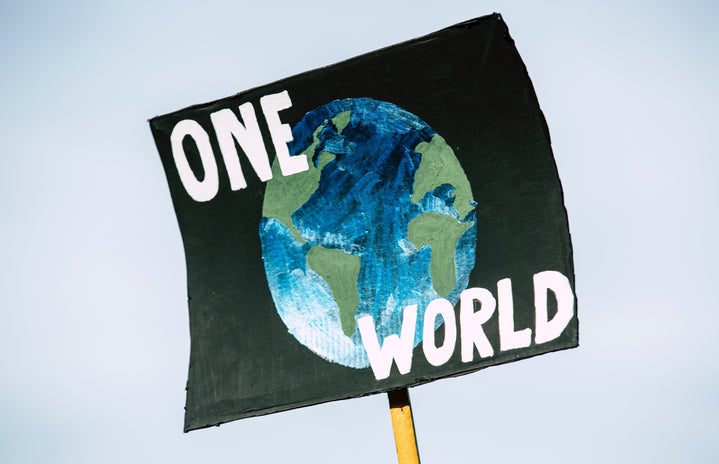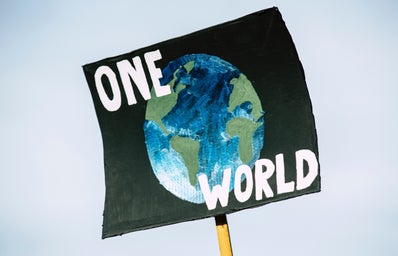Despite being separated by a computer screen, it’s easy to see how Hannah Chaouli’s colorful personality influenced the branding of her website, Clean Kick: an online publication and community for college students seeking to learn more about sustainable living.
Unlike other websites promoting sustainability, Clean Kick stands out with its bright orange and teal color palette. “I didn’t want it to look like the millennial mock-blog that’s like, passionate about plants,” says Chaouli, 20. “I wanted it to be like: Okay, this is us, this is our generation. We are bright, we are colorful, and we are taking action.”
As she speaks, she reaches up to stop her miniature fruit platter earrings from swaying. Her nails are painted different pastel shades of the rainbow and, over Zoom, the streaks of neon pink that line her eyelids are subtle yet noticeable. “I want it to really encompass the power of our generation and hopefully that can inspire people,” Chaouli states.

Originally from Los Angeles, California, Chaouli is a third-year business student at Northeastern University with concentrations in social innovation and marketing, and a minor in sustainable business practices. From the start, it was important to Chaouli to incorporate conversations about sustainability into her business education. “We live in a very capitalist society, and I think, like, yes, there is no ethical consumption under capitalism, but at least there are some better practices that you can pick up to make your organization one that isn’t super terrible.”
Clean Kick isn’t Chaouli’s first effort to raise awareness for sustainable living. For her final project in her junior year of high school, she built a bicycle generator that she later hooked up to a blender at a smoothie she had set up outside of the school to demonstrate clean energy. Students could pick a smoothie from the menu Chaouli created, she’d put the ingredients in the blender, and then the students could get on the bicycle and power the blender by cycling. It was a relatively successful demonstration, as Chaouli recalls a good number of students lined up to ride the bicycle. But the California heat made it difficult to keep the blender from overheating.
“I mean, I have to be absolutely honest, it definitely wasn’t working,” Chaouli laughs. “But it sparked my interest in showing people that they are cool ways of being. You can still get like the benefit that you wanted, the smoothie that you wanted, out of doing something that is different from just regularly running.”
Soon after, Chaouli upcycled a soap bin that a local car wash was getting rid of and made a rotating compost bin out of recycled materials for students to use after learning how to in her physics class. She doesn’t know if the students still use it to this day, but it brought attention to the food waste the school and the students were creating. It also taught them how they could turn it into something beneficial for the environment: soil.
The U.S. waste crisis has always been at the center of Chaouli’s sustainability journey, as she explains. She has made several prior efforts to minimize her waste by recycling and choosing sustainable products over those made of plastic. But she wanted to challenge herself for her senior project, so she decided to try living zero-waste, a lifestyle that focuses on sending nothing to the landfill. “I wanted to understand what that actually meant, understand how much waste I was actually producing on a regular basis,” Chaouli explains.
For two weeks, she carried a trash bag in her backpack to collect the waste she created. She’d separate her portion of the trash created from family meals and, at the end of each day, she would weigh it. When the two weeks were up, she had two trash bags full of food and plastic waste.
It was an eye-opening experience, as Chaouli describes it. “I was so conscious of how much I was actually consuming and how much I was using because I was actually holding my trash with me, which was—I mean, definitely smelly, but it was worth it.” She continued her zero-waste lifestyle for a month after her project was over and even went vegan. Chaouli credits it to be a valuable experience; she was able to explore different aspects of what she cared about first-hand. Unfortunately, this came with its challenges.
Grocery shopping for package-free food was time-consuming, and on top of that, she experienced extreme iron deficiency and fatigue. As rewarding as living zero-waste was, the lifestyle wasn’t sustainable for Chaouli, especially since she was about to leave for college across the country. She didn’t know whether or not she’d have access to the resources she’d need to continue living zero-waste. It was through this experience that Chaouli noticed there was a significant lack of information on how college students could live sustainably.
There weren’t resources on how to navigate eating at dining halls sustainably or a list of package-free grocery stores. With college students making up a significant percentage of the population in U.S. cities, Chaouli saw this as a problem and one that she wanted to solve. “In the back of my head, I was always thinking: I need to bring together the community of people who have this similar experience to me where you care about the planet and you want to do so much, but you don’t know how with the resources and time that you have. This entire time I was thinking of a solution, and so Clean Kick is sort of my solution.”
———————————
Hannah Chaouli was supposed to spend the spring semester of her second year at Northeastern University working for her first co-op (cooperative education). It was all set up and ready to go, but after learning that the start-up had completely changed its business focus, she dropped it. Classes had already started and it was too late for her to trade her co-op for another semester of school. Her only options were to either find another internship—which she’d need to do within a week in order for it to count towards her working requirement, or take the semester off. She chose the latter.
When Northeastern University sent students home to finish the semester remotely because of COVID-19 not even a month later, Chaouli took it as a sign. “I was like, I think this is my time to really bring together a community and sort of explore what solution is,” Chaouli says.
She had recently finished the WeBuild program of the Women’s Interdisciplinary Society of Entrepreneurship (WISE), an organization at Northeastern University that supports female entrepreneurs through a series of workshops and various focused programs. WeBuild, one of the programs, is a semester-long thought-incubator that helps eight to twelve women build a project they are passionate about from the ground up. Chaouli used the resources and knowledge she had gained from the program to begin creating her community: Clean Kick.
She began talking to others who reassured her that she wasn’t the only one who had noticed the gap in sustainable living. “Everybody who I talked to said: the more people that I talk to about sustainability, the more I feel inspired to continue doing things that are for the sake of the planet in my daily life,” says Chaouli. There was an evident need for the community Chaouli wanted to build, but she knew it needed to be more than a publication promoting sustainable living in the context of zero-waste. It needed to be inclusive of everyone seeking to learn more about sustainability regardless of their prior efforts.
“Another thing I heard is: I love the planet so much, and I do all these things. I have my reusable water bottle with straws and everything. But then I feel so guilty every time I accidentally, you know, go to [Pavement Coffeehouse] and get a disposable cup for my coffee,” recounts Chaouli. “Especially right now during COVID, like, we can’t even use our reusable stuff outside of our house anymore.”
“There’s that guilt factor with sustainability, and we’ve completely eliminated that from Clean Kick,” Chaouli says. “I think that people really want to educate themselves and learn about sustainable tips but also learn about what’s happening around the world and inform themselves so they can actually feel like they don’t have imposter syndrome about being environmentalist, or about being somebody who cares about the planet.”
It was a big project Chaouli wanted to bring to life and she knew she couldn’t do it alone. In May, she posted a story on her Instagram explaining how she was working on a project that had to do with sustainability and if anyone was interested in helping, to contact her. She received thirty responses. “Which was super impressive cause, like, I was thinking, like, probably four,” says Chaouli. She explained the project further to those who were interested, got to know them and what skills they could offer to the development. She held interviews over the phone, sent out Google Forms, set up skill groups, and slowly but surely, Chaouli had built herself a team.
After a few short months of website design and content preparation, Clean Kick was launched on August 4th, 2020. The publication was created with the mission to support college students through their exploration of sustainability in two parts: First, in the aspect of intersectional environmentalism, “where people can explore all the topics in the world that we’re facing, and what needs to happen to help us get back to a state of environmental safety,” explains Chaouli. And second, in the aspect of what an individual can do in their everyday life and how they can be a conscious consumer while still being a college student on a tight budget and limited time.
Already on the website, there are articles on fast-fashion, sustainable habits for eating out, reducing your meat intake, and repurposing old containers—all ways to minimize individual negative impact on the environment. But Chaouli acknowledges that the battle to save the planet is much bigger than individual efforts.
“I think the beauty of Clean Kick is that we don’t know the answers,” says Chaouli. “We know there’s only so much we can do as consumers and as college students, because even if I spend my entire life going zero-waste vegan, corporations are still pumping out fossil fuels and so much other junk that’s going into our atmosphere, going into our grounds, going into just everything. And that’s what the primary source of the problem is.”
———————————
The hardest part of starting Clean Kick, as Chaouli recounts, was leading the initiative. “Honestly, I’ve had a lot of imposter syndrome about being the person that’s going to, like, lead this initiative. I’m working with about 20 individuals who are a part of the thinking team. I’m actually making Clean Kick, like, an actual business or actual publication that people want to take part in and that is, like, actually legitimate.”

With the start of the fall semester, there’s been a standstill in content publication as members of the Clean Kick team are beginning classes and managing other commitments outside of the publication. This is a minor issue, Chaouli explains, and one she is learning to navigate. “We all just got back to school and we all have so much going on right now,” adds Chaouli. “This isn’t a job and it’s not like a student organization, so what is it? It’s this weird, like, intern balance where people are passionate and that’s why they’re here, but sometimes things fall through because we’re all busy. We all have our own lives, too.”
Nonetheless, she isn’t worried. Chaouli has made it priority to ensure quality over quantity in terms of what is published on Clean Kick. Everything that is posted through the brand, whether it’s on the website or on a social media platform, is thoroughly researched by the Clean Kick team and goes through weeks of planning. “We are still at such a young stage where it’s totally OK if we need to just stop a little bit and regroup,” explains Chaouli, “because at the end of the day we’re going to come back way better than we started. That’s just the case. Our content is going to be infinitely better on our website since we’ve taken time to regroup, and reset, and actually understand what we want to bring to the community that we’re creating.”
The initial launch of Clean Kick showed significant public interest, with over a thousand organic Instagram users following the publication’s social media page within the first week. It was reassurance Chaouli hoped for. “It’s really good to see that we can build a community,” says Chaouli. “We just have to start backing it up with all the information we want to bring to people, and different stories we can tell through our website.”
One of Chaouli’s goals within the coming months is to expand the Clean Kick team. Aside from having an issue with content production, a majority of the current members are from Northeastern and are predominantly white. Chaouli hopes to bring on content writers from different schools, majors, and backgrounds across the United States to promote an intersectional understanding of environmentalism.
“Part of the mission [of Clean Kick] is we really want to be able to encompass all different perspectives. Because, yeah, I’m a white girl that goes to a white institution, and my experience with sustainability is incredibly different from somebody who doesn’t have that experience and that’s what I’m trying to learn about,” says Chaouli. “I’m trying to, you know, bring those experiences together and have more of a dialogue about them instead of having separate conversations.”
In addition to being the founder of Clean Kick, overseeing everything that occurs within the brand, Chaouli is also the Co-Director of WISE and is in charge of planning external events for her sorority, Kappa Delta. When asked how she manages the demands of these roles on top of her coursework, Chaouli laughs. “The answer is, I don’t.”
“I am so bad at checking my emails, I’m so bad at checking my texts. And it’s hard, because I feel, like, sometimes I’m missing out on things because there’s just so much stuff coming at me,” says Chaouli. She takes a moment. “I think being transparent with the people around me, in WISE, or my sorority, or Clean Kick about how much time I actually have is really important.”
“I’m not the perfect leader at all, and I’ve definitely dealt with that. At the end of the day, I’m like a 20-year old girl from Los Angeles. I don’t know what the best practices are. I don’t know how to start an actual business. I don’t know how to copy-write anything. I’m just learning, and hopefully I can bring on some people who know a little bit more than I do about those things.”
In the future, Chaouli says she can see Clean Kick expanding into promotional merchandise like stickers and eventually, a podcast—a prospect Chaouli expressed excitement in. But first, she just wants to focus on her team. “We’re just learning as we go, and I think that’s definitely the best part about Clean Kick. The people I get to work with are just so patient and so passionate and just so go-with-the-flow and ready to try new things, cause we’re just learning and I love it.”




